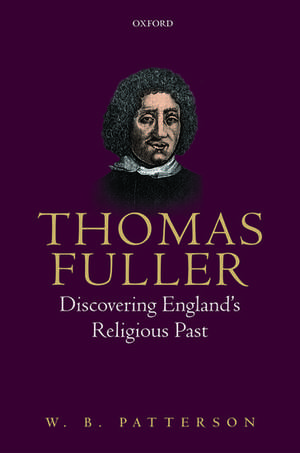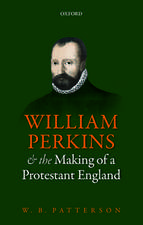Thomas Fuller: Discovering England's Religious Past
Autor W. B. Pattersonen Limba Engleză Hardback – 15 feb 2018
Preț: 703.98 lei
Preț vechi: 1008.90 lei
-30% Nou
Puncte Express: 1056
Preț estimativ în valută:
134.75€ • 146.42$ • 113.26£
134.75€ • 146.42$ • 113.26£
Carte tipărită la comandă
Livrare economică 11-17 aprilie
Preluare comenzi: 021 569.72.76
Specificații
ISBN-13: 9780198793700
ISBN-10: 0198793707
Pagini: 380
Dimensiuni: 164 x 242 x 30 mm
Greutate: 0.7 kg
Editura: OUP OXFORD
Colecția OUP Oxford
Locul publicării:Oxford, United Kingdom
ISBN-10: 0198793707
Pagini: 380
Dimensiuni: 164 x 242 x 30 mm
Greutate: 0.7 kg
Editura: OUP OXFORD
Colecția OUP Oxford
Locul publicării:Oxford, United Kingdom
Recenzii
Patterson puts Fuller's achievements on a par with the great Dr Samuel Johnson and his eighteenth-century dictionary; given this detailed, scholarly biography, few would argue with that
In all, this is a fascinating study that brings to life both a man and the milieu in which he lived and worked.
This is a study of the author of the first biographical dictionary for England and Wales, a scholar who wrote for a general readership, and a clergyman whose Church-History of Britain set the framework for future church histories of this island and which remains the foundation for the Protestant tradition of the history of Christianity in Britain. W. B. Patterson gives us both an analysis of Thomas Fuller's life (1608-61) and career as a scholar, churchman, and family man, and a detailed study of his major works, rooted in the context of historical writings in both Britain and the European continent, Catholic and Protestant, in the post-Reformation period. . . . In all, this is a fascinating study that brings to life both a man and the milieu in which he lived and worked.
Spanning the scope of Fuller's life, Brown Patterson has written an intellectual biography that also offers considerable insight into how a highly educated clergyman negotiated the rapidly shifting political terrain of Caroline England.... With Thomas FullerPatterson has drawn the map for future Fuller studies while making a crucial contribution to the study of seventeenth-century English historiography.
Thomas Fuller accessible to today's historians. I highly recommend this book as a text which the non-specialist in early modern theology can use to quickly navigate around Fuller's writings so as to find his viewpoint on a wide range of social and historical issues that were pertinent to his day whilst, for the student of the history of theology, this book is simply indispensable... by being a historian who largely suppressed his theological bias in his historical works, Fuller can be seen as a morning star of the Rankean historical method which two centuries later would see history fully separate from theology as an academic discipline. In this way, Patterson has aptly defended his book's main thesis that Thomas Fuller was a pioneer historian.
Thomas Fuller's ... is a life badly in need of a thorough and generous assessment. He is fortunate in his biographer. Thomas Fuller: Discovering England's Religious Past is impressively detailed, unabashedly admiring and (given British and ecclesiastical history's current absorption in memory studies, as well as its ongoing interest in the history of historiography) very timely.
[The book] is thoroughly researched, convincingly argued, and clearly written. Students of the history of the English Church simply cannot afford to ignore it.
Patterson effectively sketches Fuller's gregarious, yet deeply introspective, personality, which personalizes both his work as a historian and the unsettled times in which he lived. Patterson's work is a convincing reassessment of one of the major early modern English historians and a nuanced account of the social, theological, and political unrest of 17th-century England.
In Thomas Fuller: Discovering England's Religious Past, W. B. Patterson has written a thoughtful, insightful, and generally interesting account of Thomas Fuller, who had a unique position in the seventeenth century to view the chaotic political changes that accompanied his age. Patterson's ability to weave this intellectual biography between a micro and macro-historical study speaks to his ability as a writer and researcher ... I would recommend Thomas Fuller: Discovering England's Religious Past to any individual interested in the seventeenth century or in British history generally. It would also make a great addition to a graduate-level reading seminar or even as a reading for an advanced undergraduate course in the Tudor-Stuart era.
In all, this is a fascinating study that brings to life both a man and the milieu in which he lived and worked.
This is a study of the author of the first biographical dictionary for England and Wales, a scholar who wrote for a general readership, and a clergyman whose Church-History of Britain set the framework for future church histories of this island and which remains the foundation for the Protestant tradition of the history of Christianity in Britain. W. B. Patterson gives us both an analysis of Thomas Fuller's life (1608-61) and career as a scholar, churchman, and family man, and a detailed study of his major works, rooted in the context of historical writings in both Britain and the European continent, Catholic and Protestant, in the post-Reformation period. . . . In all, this is a fascinating study that brings to life both a man and the milieu in which he lived and worked.
Spanning the scope of Fuller's life, Brown Patterson has written an intellectual biography that also offers considerable insight into how a highly educated clergyman negotiated the rapidly shifting political terrain of Caroline England.... With Thomas FullerPatterson has drawn the map for future Fuller studies while making a crucial contribution to the study of seventeenth-century English historiography.
Thomas Fuller accessible to today's historians. I highly recommend this book as a text which the non-specialist in early modern theology can use to quickly navigate around Fuller's writings so as to find his viewpoint on a wide range of social and historical issues that were pertinent to his day whilst, for the student of the history of theology, this book is simply indispensable... by being a historian who largely suppressed his theological bias in his historical works, Fuller can be seen as a morning star of the Rankean historical method which two centuries later would see history fully separate from theology as an academic discipline. In this way, Patterson has aptly defended his book's main thesis that Thomas Fuller was a pioneer historian.
Thomas Fuller's ... is a life badly in need of a thorough and generous assessment. He is fortunate in his biographer. Thomas Fuller: Discovering England's Religious Past is impressively detailed, unabashedly admiring and (given British and ecclesiastical history's current absorption in memory studies, as well as its ongoing interest in the history of historiography) very timely.
[The book] is thoroughly researched, convincingly argued, and clearly written. Students of the history of the English Church simply cannot afford to ignore it.
Patterson effectively sketches Fuller's gregarious, yet deeply introspective, personality, which personalizes both his work as a historian and the unsettled times in which he lived. Patterson's work is a convincing reassessment of one of the major early modern English historians and a nuanced account of the social, theological, and political unrest of 17th-century England.
In Thomas Fuller: Discovering England's Religious Past, W. B. Patterson has written a thoughtful, insightful, and generally interesting account of Thomas Fuller, who had a unique position in the seventeenth century to view the chaotic political changes that accompanied his age. Patterson's ability to weave this intellectual biography between a micro and macro-historical study speaks to his ability as a writer and researcher ... I would recommend Thomas Fuller: Discovering England's Religious Past to any individual interested in the seventeenth century or in British history generally. It would also make a great addition to a graduate-level reading seminar or even as a reading for an advanced undergraduate course in the Tudor-Stuart era.
Notă biografică
W. B. Patterson, Professor of History (Emeritus) at the University of the South in Sewanee, Tennessee, has written widely on British and European history and religion. His publications include King James VI and I and the Reunion of Christendom (Cambridge University Press, 1997), which won the Albert C. Outler Prize in ecumenical church history from the American Society of Church History. He is an active member of the Ecclesiastical History Society of Great Britain and a fellow of the Royal Historical Society.

